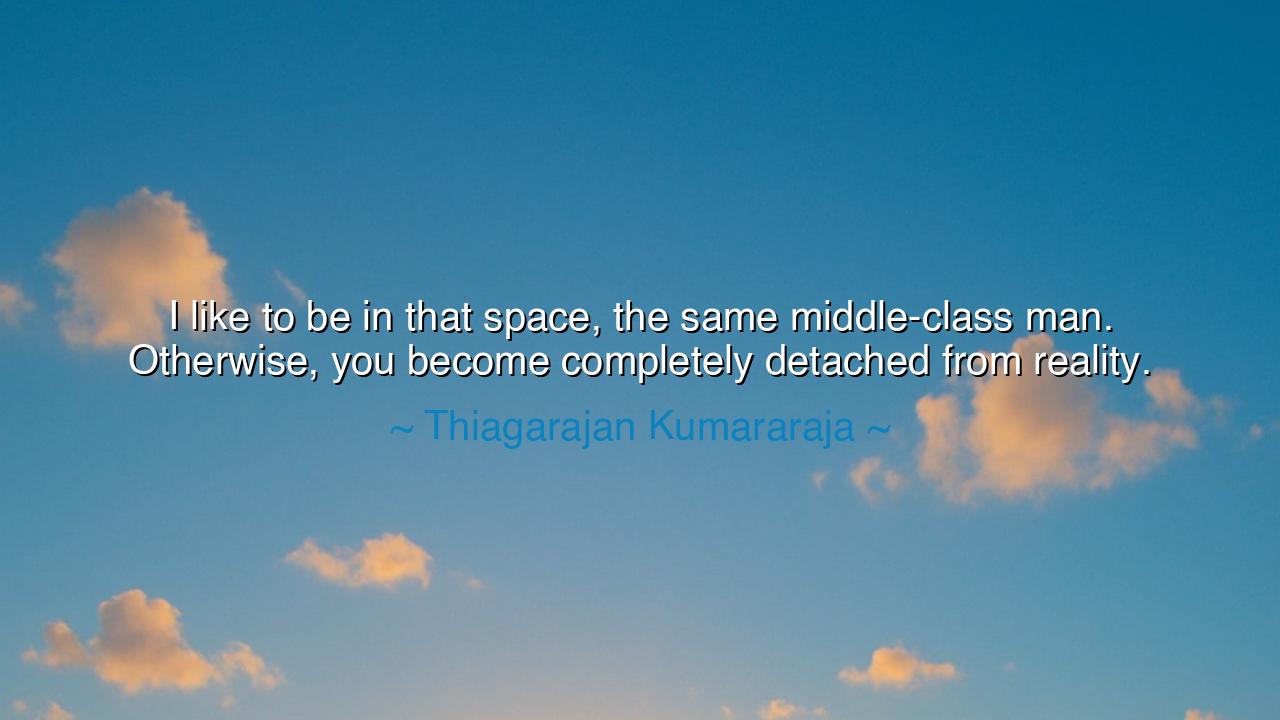
I like to be in that space, the same middle-class man. Otherwise
I like to be in that space, the same middle-class man. Otherwise, you become completely detached from reality.






"I like to be in that space, the same middle-class man. Otherwise, you become completely detached from reality." These words from Thiagarajan Kumararaja strike at the heart of the human experience, urging us to remain grounded, to not lose touch with the essence of life that connects us all. Kumararaja expresses a powerful sentiment about the importance of staying connected to the everyday struggles and realities of the world, particularly the middle class—the vast swath of people who, while not wealthy, make up the backbone of society. To lose sight of this world, he suggests, is to risk becoming detached from the very pulse of humanity.
In the ancient world, the great thinkers were constantly reminding their followers to live authentically, to remain in touch with the common experience. Socrates, for example, rejected the luxury of aristocratic detachment. He lived simply, not for the sake of poverty, but because he knew that true wisdom came from understanding the lives of those who were not elevated by wealth or power. Plato, his student, shared this vision in his work, where the philosopher-king was not one who distanced himself from the struggles of society, but one who understood them deeply and governed with the wisdom of the people in mind. They understood that true knowledge and power could only come from engaging with the real world, from the soil in which society's roots were planted.
This ancient wisdom resonates deeply with Kumararaja’s view. The middle class, with its daily rhythms of work, family, and social interaction, represents the pulse of society. It is within this realm that the most genuine human connections are formed—not within the marble halls of the rich or the ivory towers of academia, but in the humble homes and bustling streets of the ordinary. The middle-class person, striving and laboring day by day, often carries the greatest understanding of what truly matters: relationships, community, and basic survival. To step away from that space, to grow detached from those realities, is to risk losing touch with the human condition itself.
Consider the life of Mahatma Gandhi, whose humble origins and simple lifestyle never divorced him from the realities of the masses. Though he would become one of the most influential figures in history, leading India to independence, Gandhi never lost sight of his connection to the people. He wore simple homespun clothes, lived in ashrams, and walked among the poor. His strength lay not in wealth or elite education, but in his ability to see the world through the eyes of the ordinary people. Gandhi understood that true leadership required an intimate understanding of the struggles, hopes, and dreams of those at the grassroots level. In this way, he exemplified the very spirit that Kumararaja speaks of—the importance of remaining grounded, of living the truth that binds us all.
In contrast, we see the fate of many great leaders or intellectuals who, once removed from the realities of everyday life, became disconnected from the people they sought to serve. History has seen many powerful rulers or philosophers who, upon ascending to great power, lost sight of the struggles of the common people. Louis XVI of France, for example, was said to have been oblivious to the suffering of his people, believing that they could simply make do with less food during the famine. His detachment from the realities of the people’s lives ultimately contributed to the eruption of the French Revolution. Had he remained connected to the everyday realities of his subjects, perhaps his rule would have taken a different course.
The lesson Kumararaja imparts is vital for our modern world, where the temptation of detachment has never been greater. The advent of technology and social media has created an environment where we can easily become isolated from the physical world, the world of human interaction and shared experience. The rise of digital elites, the focus on personal success, and the pursuit of wealth have created a gulf between those at the top and the common people. As society becomes increasingly divided along lines of wealth, education, and social media status, we must ask ourselves: How connected are we to the realities of everyday life?
The clear lesson is that detachment from the ordinary world leads to an understanding that is not only limited, but also dangerous. If we are to truly understand the world, to lead with wisdom and compassion, we must stay connected to the lives of the ordinary people, the ones whose struggles are often overlooked. Kumararaja’s words serve as a reminder that it is the middle-class man—the worker, the dreamer, the struggler—who holds the key to true knowledge. In order to grow, in order to learn, we must stay grounded, immersed in the realities that make us human.
Thus, in your own life, strive to remain connected to the world around you. Live simply, engage with your community, and resist the temptation to retreat into worlds of excess or disconnection. Seek wisdom not in the halls of privilege, but in the everyday lives of those who share your journey. By doing so, you will ensure that your understanding remains deep, authentic, and true to the very pulse of life itself.






AAdministratorAdministrator
Welcome, honored guests. Please leave a comment, we will respond soon